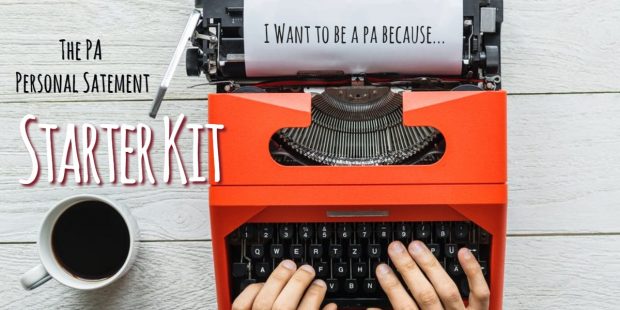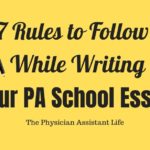If you are struggling to write your PA school personal narrative, then this message is for you.
Here's why . . .
PA school admissions teams have an uncanny ability (honed on the job) to detect when an applicant's essay rings false.
And you need to realize that there is a cost to writing a "so-so," uninspired personal statement that’s written to meet the status quo.
What most people do when they can't find the right words for their essays is to do what the rest of us do; procrastinate. You place the task of writing your PA school narrative on the back burner until inspiration rides in and saves the day.
But for most people, that day never comes.
- They wait until the last minute and end up rushing their essay.
- They piece together partially formed ideas or force concepts that aren't their own, so their essay ends up sounding mechanical, disjointed, and uninspired.
- They take advice from well-intentioned family and friends who love them, yes, but are unable to give them the naked truth that will make their essay shine.
- Most people are just not professional writers.
- And most people don’t have the time, resources, or money to hire one that knows a thing or two about how to write a winning PA school essay.
And what happens if you do nothing? If you just keep doing what you've been doing, hoping the problem will solve itself?
How a simple tool can solve your personal statement writing woes
I've got an answer that works. Here's the story.
I receive about a dozen essays from prospective PA school students every week. Kind, well-intentioned pre-PAs looking for some guidance on how to write their PA school personal statement.
But not everyone can afford a one-on-one personal statement edit, and I can really only do one or two free essay evaluations per month.
Then I had an idea. "What if I created a time-tested template that would help them write a better version of their personal statement? Help them to put into words the best version of themselves.
What if I could help them wordsmith their essay, polish it, and make it sing?
What if they walked out after a few hours with a finished draft that spoke to them AND the admissions committee?
And that's exactly how we created the Ultimate PA School Personal Statement Starter Kit.
The Ultimate PA School Personal Statement Starter Kit
When you download your starter kit, you'll join me and hundreds of other PRE-PAs in using a time-tested PA school essay template that works.
We take you step-by-step through a series of guided writing prompts to help you craft a foolproof first draft of your PA school personal statement.
I'm going to hold your hand every step of the way and walk you through this process.
- Make your mark with a standout introduction.
- Show us your journey through four prompted body paragraphs
- Then, wrap it up and tie it in a bow with a conclusion that will make even your mom proud.
- We provide you with guided prompts every step of the way. When you have each section completed, just click the “export as text” button in the included PDF, and the tool will magically compile each of your paragraphs together into a finished draft.
- Copy and paste your essay into a character and word count tool (here's one I like) to make sure your essay is within the CASPA character limit.
- Click send!
Now you've finished your essay, sit back, and watch the acceptance letters roll in. Well, maybe it’s not that easy, but you get my point.
And the best part. Your starter kit is totally free!
Fill out this form for instant access to your PA school personal statement starter kit.
Download Your FREE Personal Statement Starter Kit

Follow our time-tested prompts as we walk you through every step of the process from concept to conclusion.
Download Your Ultimate PA School Personal Statement Starter Kit

Just follow our time-tested prompts as we walk you through every step of the process from concept to conclusion.
Your download will arrive instantaneously!
At times like these, I find it helps to recite the words of distinguished writer Neil Gaiman: “This is how you do it: you sit down at the keyboard, and you put one word after another until it's done. It's that easy, and that hard.”
PS If you need just a little more assistance with your essay, we can help you with that too.
Warmly, Stephen Pasquini PA-C
View all posts in this series
- How to Write the Perfect Physician Assistant School Application Essay
- The Physician Assistant Essay and Personal Statement Collaborative
- Do You Recognize These 7 Common Mistakes in Your Personal Statement?
- 7 Essays in 7 Days: PA Personal Statement Workshop: Essay 1, “A PA Changed My Life”
- PA Personal Statement Workshop: Essay 2, “I Want to Move Towards the Forefront of Patient Care”
- PA Personal Statement Workshop: Essay 3, “She Smiled, Said “Gracias!” and Gave me a Big Hug”
- PA Personal Statement Workshop: Essay 4, “I Have Gained so Much Experience by Working With Patients”
- PA Personal Statement Workshop: Essay 5, “Then Reach, my Son, and Lift Your People up With You”
- PA Personal Statement Workshop: Essay 6, “That First Day in Surgery was the First Day of the Rest of my Life”
- PA Personal Statement Workshop: Essay 7, “I Want to Take People From Dying to Living, I Want to Get Them Down From the Cliff.”
- Physician Assistant Personal Statement Workshop: “To say I was an accident-prone child is an understatement”
- 9 Simple Steps to Avoid Silly Spelling and Grammar Goofs in Your PA School Personel Statement
- 5 Tips to Get you Started on Your Personal Essay (and why you should do it now)
- How to Write Your Physician Assistant Personal Statement The Book!
- How to Write “Physician Assistant” The Definitive PA Grammar Guide
- 101 PA School Admissions Essays: The Book!
- 5 Things I’ve Learned Going Into My Fourth Physician Assistant Application Cycle
- 7 Tips for Addressing Shortcomings in Your PA School Personal Statement
- The #1 Mistake PRE-PAs Make on Their Personal Statement
- The Ultimate PA School Personal Statement Starter Kit
- The Ultimate Guide to CASPA Character and Space Limits
- 10 Questions Every PA School Personal Statement Must Answer
- 5 PA School Essays That Got These Pre-PAs Accepted Into PA School
- 7 Questions to Ask Yourself While Writing Your PA School Personal Statement
- 101 PA School Applicants Answer: What’s Your Greatest Strength?
- 12 Secrets to Writing an Irresistible PA School Personal Statement
- 7 Rules You Must Follow While Writing Your PA School Essay
- You Have 625 Words and 2.5 Minutes to Get Into PA School: Use Them Wisely
- What’s Your #1 Personal Statement Struggle?
- 31 (NEW) CASPA PA School Personal Statement Examples
- How to Prepare for Your PA School Interview Day Essay
- Should You Write Physician Associate or Physician Assistant on Your PA School Essay?
- Meet the World’s Sexiest PA School Applicants
- PA School Reapplicants: How to Rewrite Your PA School Essay for Guaranteed Success
- How to Write a Personal Statement Intro that Readers Want to Read
- PA School Reapplicant Personal Statement Checklist
- How to Deal with Bad News in Your Personal Statement
- Inside Out: How to use Pixar’s Rules of Storytelling to Improve your PA Personal Statement
- Ratatouille: A Pixar Recipe for PA School Personal Statement Success
- Personal Statement Panel Review (Replay)
- Mind Mapping: A Tool for Personal Statements, Supplemental Essays, and Interviews
- Start at the End: Advice for your PA School Personal Statement
















Ruff draft Personal Statement from Starter Kit. Your feed back is appreciated, and thank you in advance.
On Thanksgiving day of 2019, we were notified that our Fire Chief will be making a special visit. The shift was called to the kitchen and requested to have a seat. The next thing I know, I hear paramedic Wilson come to the front. That morning the Fire Chief awarded me with the, “I Made A Difference,” award, one of the highest in the department. She awarded me the award for my outstanding work as a paramedic and can-do attitude. Fast forward to the early pandemic, I ran a ems call that sparked a flame that would not die out. We were called for a sick person at an elderly housing. While providing care to this patient I deemed them septic and started treatment. While transporting the patient asked was he going to die. I advised him that I will do everything in my power to keep him alive. That day I knew the wait was over and it was time to leap to pursue the Physician assistant career.
Before becoming a paramedic from 2010-2015, it was a journey. After college, I decided to pursue a Master’s degree and during my studies, I decided I wanted to become a firefighter. After completed my MS degree, I pursued a career as a firefighter. In 2013, I attended a rigorous EMT program at Georgetown University having to maintain an 80% average. After completed the program and passing the NREMT exam, I started working as an EMT. While working as an EMT I prided myself on having great bedside manners. Many of my patients thanked me for it and said I should become an MD. One of my partners was getting their PCE hours to apply to PA. She was the first person to introduce me to the profession and it interested me. I decided I would continue pursuing education as a paramedic and then go from there. As a paramedic, I served each patient wholeheartedly being empathetic and caring.
Once I made my mind about pursuing the PA profession, I started my quest to learn everything I could about PA. Over the past few years, I have made cold calls, emails, and while transported patients at the hospital introduce myself to PAs that I saw. I’ve got the opportunity to speak with PAs in Oncology, Internal medicine, Emergency Medicine, Trauma, and an Assistant Medical director. My other experience of learning about the PA profession came from virtual shadowing ENT, FM, Urgent care, and oncology. I admired each PA I ran across because of their passion for the work they do. I Admired Kate Kramer PA-C, Assistant medical director, due to her story and the connection of her being an EMT before becoming a PA. From my researching and connecting with PAs, I knew that PA is the route for me. It appealed more to me because MD wouldn’t be conducive for my family. NP was not due to having to go to nursing school first, and I like the medical model more than the nursing model. Also, NP would not allow me to switch specialties without having to get another certification.
The PA profession is for me and my life, work, and education will help me to be successful in accomplishing my goal of being a PA. For my life experience, I grew up in the projects with a single mom who had 6 kids, who struggled but worked hard to provide the best for us. My mother taught me hard work. Hard work is one component of being a successful PA student and future PA. My education experience in completing an MS degree, EMT, and paramedic programs have prepared me for the rigor of PA school. My EMT and Paramedic program has given me the foundation needed for the next level in healthcare. My work experience as a behavioral specialist has helped me learn how to work with irate and mentally ill patients. EMT and Paramedic jobs have given me the skills to provide excellent care to my patients and perform efficiently in high-stress situations.
While working with at-risk youth as a behavioral specialist and teacher’s aid, I grew a heart to serve in an underserved community. I would overhear some of the students not want a healthcare provider, not their race take care of them. Which is sad, and maybe I could help them change their mind. I also volunteered to serve the homeless at a food bank. While serving them I saw how some needed wound care. These experiences have made me passionate to start a mobile medical unit once I am done with PA school.
Before all of the success and amazing experiences, I had lots of failures. One of my biggest failures came in undergrad. Before college, my mom was fighting cancer. While in college being a track & field athlete, my mother passed away. It was hard for me to study or even focus and my grades suffered. I had very bad study habits and no academic focus. Since then I have found my passion, learned study habits that helped me be academically successful.
As I did before getting the highest fire department award I will do the same in PA school. I will bring my can-do attitude, hard work, dedication, and work experience to help me be a successful PA student and future PA.
FIRST TIME APPLICANT, FEEDBACK APPRECIATED! ERIC T.
The bell rings at 5am, I get up and put my gear on without opening my eyes. The familiar voice comes from the speaker in the bunkroom first giving the address and then a complaint that wakes me up instantly, cardiac arrest. I’m on the ambulance this time, so we rush to the truck and are out of the station with no time to waste. We arrive on scene and I get the backboard and jump bag while my partner pulls the drug box and monitor on to the stretcher. We enter the house and find our patient laying prone, unconscious between the bathroom and the hallway. We hurry to rotate him on to his back on the backboard, only to find a pool of black coffee ground emesis on the floor and around his mouth. He is not breathing and does not have a pulse, so I begin CPR while my partner prepares to secure his airway. Our station’s engine crew is right behind us helping with setting up the defibrillator pads and starting IV’s.
The patient’s wife tells us that he had surgery on his small intestines and that he has had abdominal pain all night, and he collapsed when trying to go to the bathroom. With no shock advised on the monitor, we finish the round of CPR and load the patient on to the stretcher and in to the ambulance as quickly and safely as possible. Two engine crew members hop in to the back of the ambulance and I get in front and drive to the hospital. On the way, I hear from the back of the truck that they have a pulse and stop performing CPR. We arrive at the hospital and the ER team is waiting for us in the room we were given. As I am helping to move the patient from our stretcher to the hospital stretcher, I see every member of the ER team performing their various tasks as efficiently as possible. At the head of the hospital bed is the attending PA who is receiving the report from my partner. He gives a nod to my crew and I, saying “Thanks guys, we’ve got it from here.” He then turns to the ER staff and continues to coordinate steps following a ‘return of spontaneous circulation’ (ROSC).
This story is but one example of the countless incidents I have responded to as a firefighter and as an EMT. Over my 11 years spent in EMS, I have responded to every standard of living imaginable, from the depths of poverty to the upper echelon of wealth. I have treated and transported patients that come from various ethnicities, cultural backgrounds, and religions. I have made it a point to always build rapport with my patients while they are going through the most egregious events in their lives. I have learned through my experiences how to build relationships with families and how to have crucial conversations with them when dire treatments may be necessary. My bedside manner is not all that I possess, I have ideas that I can only begin to implement with a better understanding of healthcare. I believe patient care is an ever evolving entity, and I want to be at the forefront of every new discovery to help foster better patient outcomes and faster rehabilitation periods.
Understanding patient care, and treatments in a pre-hospital setting are ultimately methods that sustain patients until they are able to be treated at a higher level of care. My curiosity has turned into a desire to move towards that next level of care. I want to be that PA that receives a patient in bad shape and work with my own team to help them. Assist them in having the best possible outcome, given the situation. I want to be the PA that people can collaborate with and return too. Not only that, I want to be the PA that people talk about. I want peers to request my consultation on difficult cases, I want my staff to be proud they are a part of my team, and I want to make a positive impact in the future for healthcare.